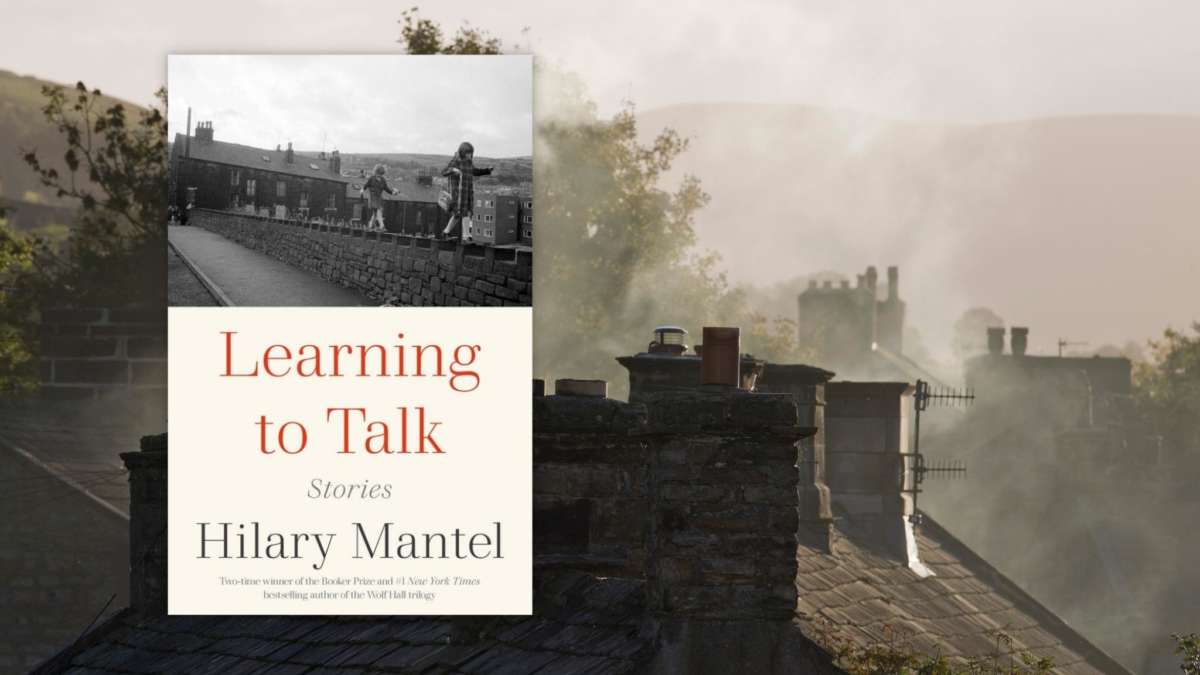Learning to Talk (Harper Perennial) may serve well as a gateway book to the best known works of luminary British author Hilary Mantel. Her words sparkle and dazzle, rippling off the pages like the sunlit water of a rapidly flowing brook. It is an easily digestible book of seven short stories, a slight expansion of the collection of the same title originally published by Fourth Estate in Great Britain in 2003. Additionally, the current version contains a new preface. The stories of a childhood spent in a village in northwest England are loosely autobiographical and written over a wide span of years.
Mantel is one of only four authors who have won the Booker Prize more than once and the sole winner for a sequel. The world-wide bestseller Wolf Hall took the honors in 2009 along with the National Book Critics Circle Award among other accolades. The second novel in the trilogy, Bring Up the Bodies, won again in 2012. The Mirror & the Light completed the set and was again long-listed for the Booker Prize but did not win the trifecta. The sheer number of honors awarded to the Wolf Hall Trilogy, as well as the length this well-researched fictional account of Thomas Cromwell and the Tudor Era, may dissuade a casual reader, but Learning to Talk demonstrates how facile the author is with language and imaginative storytelling, leaving one wanting to read all her previous work and eager to hear them spoken in the Mancunian (Manchester area) dialect of her childhood.
THE TRUE STORY OF A TUMULTUOUS CHILDHOOD
The setting of County Derbyshire, Mantel’s birthplace and childhood home, is as vital as the characters and semi-autobiographical content of the stories she tells. Located on the northern end of the county near the Peak District (England’s first national park), the town of Glossop is now a large, thriving suburban town and tourist hub with an easy 15-mile commute to Manchester. Known for its varied landscapes and dramatic scenic beauty, a large portion of the area has been dedicated to nature conservation.
When Mantel was a child, Glossop was a grim, moribund village blemished by high unemployment and shuttered mills, which stood as dark, decaying stone reminders of the early Industrial Revolution when nearly every family worked in the cotton industry. By the advent of the long-lasting depression of 1930, many mills had already closed. The World War II years brought a temporary respite with demand for materials, but the ensuing post-war slump hit hard. Businesses manufacturing cloth, ready-to-wear clothing, rubber goods and a major paper mill shuttered in the 1950s and 1960s. In 1966, Edmund Potter & Co Calico Printers of Dinting Vale, Glossop, established in 1825, was one of the last mills to close. (Mr. Potter was Beatrix Potter’s doting grandfather.) The defunct factories that weren’t demolished have since been repurposed into lodgings, shops and restaurants.
County Derbyshire was a place where everyone was preoccupied with discussing their neighbors’ lives. Glossop gossip flew through the village faster than a children’s game of Telephone (known as Chinese Whispers in the Commonwealth). The author’s family was subject of such tittle-tattle and the recipient of scornful disapproval. The most personal story, “Giving Up the Ghost,” describes the confusion, poverty, shame, secrets and perpetual fear of eternal damnation that marked much of the author’s school years in the early 1950s. Her first four years, during which time the family lived with her grandparents, were nearly idyllic. By age six and the arrival of a baby brother, her parents’ marriage was in shambles, but they were penniless Roman Catholics for whom divorce was an impossibility. Her mother’s scandalous solution was to add her lover, Jack Mantel, to the household (and her bed) while banishing her husband to a smaller bedroom shared with their daughter. They lived this way for four years until they moved away from Glossop at which point they shed the children’s father.
A LOOK BACK AT SMALL TOWN EXPERIENCES
The other stories concern rivalries, prejudices and squabbles over back garden fences. A brilliant example is told through Billy, now an accomplished and well-educated adult, in “King Billy Is a Gentleman” as he looks back at his difficult village childhood. The titular story, “Learning to Talk,” describes lessons in elocution taught by a stout shopkeeper to groups of reluctant, giggling convent schoolgirls in a highly entertaining manner. In the early 1960s, local and regional accents were snobbishly derided. Aspirational, upwardly mobile parents desired their offspring to be taught to speak “posh” or BBC proper English. It was a hilarious struggle for the pupils of Miss Webster.
Mantel’s charming short stories possess a haunting quality and will linger on the reader’s mind long after this treat of a slender volume is finished. I thoroughly enjoyed her vibrant storytelling, and I think most readers will agree.
https://booktrib.com/wp-content/uploads/2022/06/hilary-mantel.jpeg
Photo Credit: Els Zweerink
About Hilary Mantel:
Hilary Mantel is the two-time winner of the Booker Prize for her best-selling novels, Wolf Hall, and its sequel, Bring Up the Bodies. The final novel of the Wolf Hall trilogy, The Mirror & the Light, debuted at #1 on the New York Times bestseller list and won critical acclaim around the globe. Mantel is the author of over a dozen books, including A Place of Greater Safety, Beyond Black and the memoir Giving Up the Ghost.




